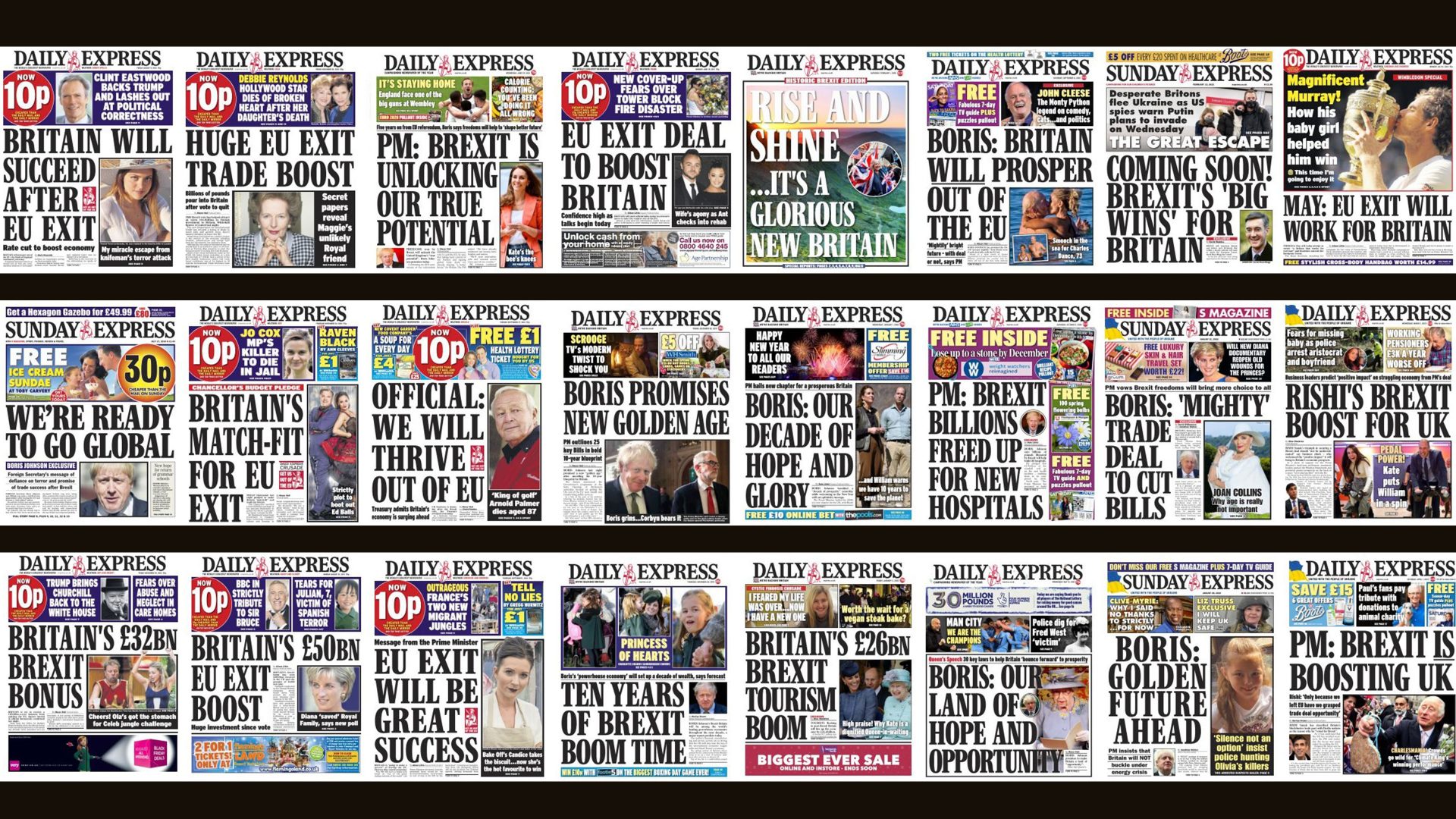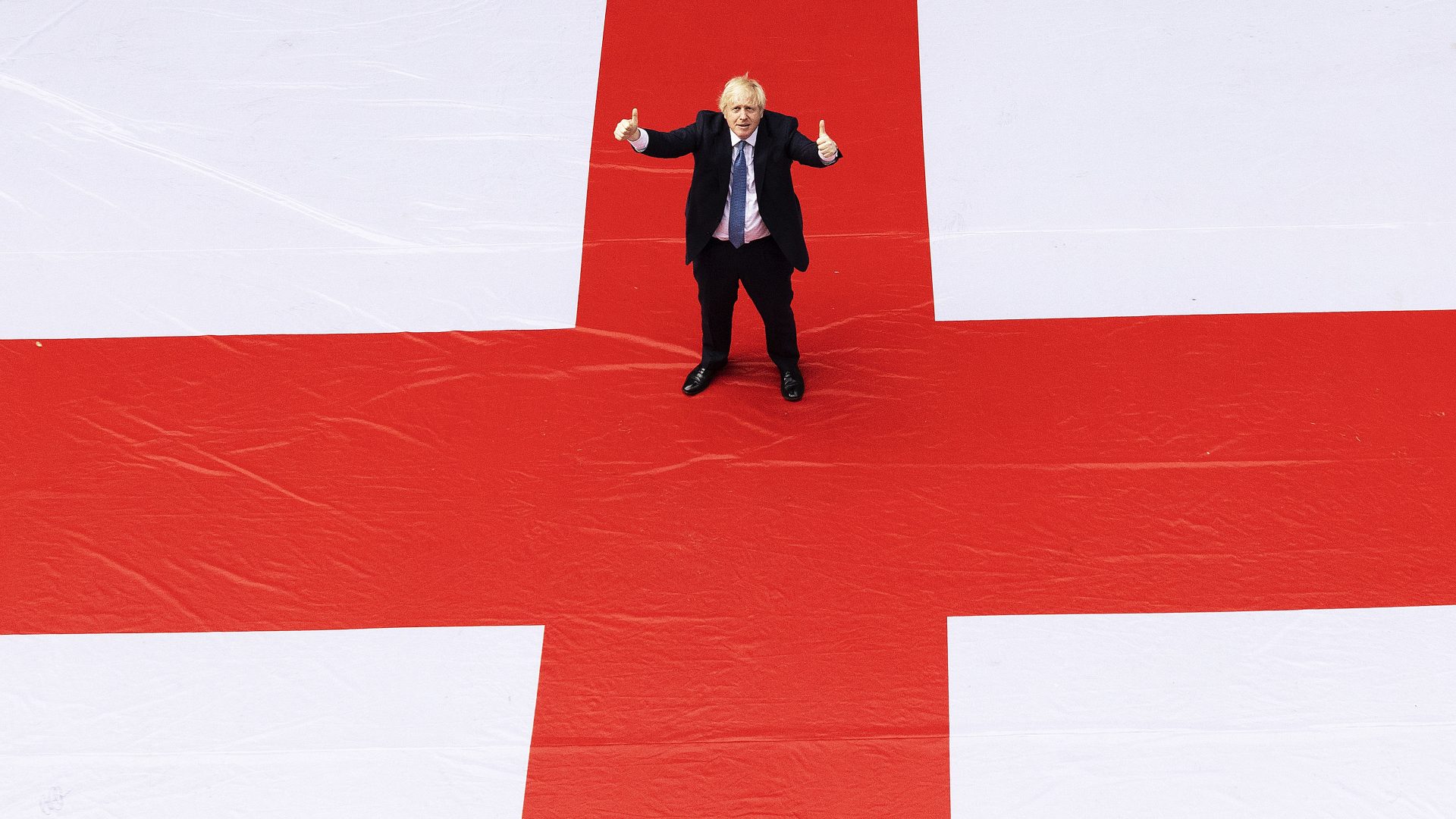Exports have fallen every month since March last year. Food inflation is the highest in western Europe. The OECD reckons we’ll have the highest overall inflation in the G20, and the IMF says we’re heading for the deepest recession in the group. We have no trade deal with America. We can’t even trade with parts of our own country. But we do have an agreement with Australia that allows us to buy their beef but forbids us from selling them ours. Net immigration is higher than ever, but we can’t find people to harvest crops or to staff hospitals and care homes.
You, dear Remainer reader, may think that these little hiccups are the result of a vote taken seven years ago this week. But were you to open a truly crusading newspaper, one with a proud history dating back to 1900, you would know that – if they exist at all – these issues are nothing to do with Brexit. Indeed, they are more than likely the fault of the “bullying” EU.
Like Nigel Farage, the Daily Express likes to take credit for Brexit. Unlike Farage, who insists it’s being done all wrong, the Express and its Sunday sister are still unrelentingly positive about its benefits for booming Britain.
The Express took ownership of Brexit in November 2010, when it asked readers to say whether they wanted a vote on our continued membership of the EU. They were given a clue as to the preferred answer by the headlines “Get Britain out of Europe” and “We want our country back”. The readers did not disappoint. More than 373,000 responded, more than half the paper’s circulation at the time – and more than twice the number who buy the paper today. And remember, this was no click on a website poll; it was back in the days when you had to cut out a coupon, fill it in, put it in an envelope, put a stamp on it and take it to the postbox.
For the next five years, it pummelled readers and MPs with stories of European iniquities that meant we MUST have a vote to get out. And when it “won” that fight and the referendum was called, it pummelled them all again until it was able to proclaim in a “special souvenir edition” that “We’re out of the EU”.
Farage may have started the ball rolling, but it was Boris Johnson, Dominic Cummings and Michael Gove who brought the goods home for Leave. And so, in much the same way, some might be tempted to think that while the Express may have been first out of the blocks, it was the Mail and Sun that swung it. Not a bit of it.
Here’s then-editor Hugh Whittow reflecting on his glory in 2017: “Some other newspapers, belatedly sensing the rising tide of support for our campaign, which had unleashed people power, tried to emulate us. While we were happy and flattered to indirectly receive their support, our five-year record demonstrated beyond dispute it was the Daily Express which had been, all along, the architect of an editorial campaign that brought about a dramatic political victory.”
And how did he mastermind this campaign? “Not,” he wrote, “on anti-EU stories about straight bananas or 27,000-word laws on the sale of cabbages”. But on concerns about open borders, British laws for British people, Project Hope not Project Fear, and a “daily agenda of thought-provoking critical analysis and commentary”.
Which is one way of describing splash headlines including “EU brainwash our children”, “EU plot to scrap Britain”, “New EU plot to tax our food”, “New lightbulbs in cancer scare”, “EU wants to merge UK with France”, “Ban shopping bags, says EU”, “EU plot to axe British number plates”, “EU threat to our gardens”, “Now kettles face EU ban” (twice), and “Teach boys to dust, says EU”. There were at least a dozen on how the EU was going to “wreck” our pensions.
And then there was the migrant scourge. The EU was advising them how to get there, giving them guides to claiming British benefits, telling them how to take our jobs. ALL of our jobs. And it was opening our door to 79 million people from Turkey.
Over the course of 2016, the Express led on the evils of migration 72 times, and on the evils of the EU and the battle for Brexit 114 times. There was hardly time to pause for the regular bulletins telling us that Madeleine McCann was still alive, that house prices were rising and that walnuts, chocolate and coffee were the things to ward off heart disease, diabetes and dementia. I’m talking about front-page leads here, not nibs (news-in-briefs) inside. This is serious journalism.
But amid all this Fear, there was some Project Hope. “Britain will succeed after EU exit”, “Huge EU exit trade boost”, “EU exit will work for Britain”, “We’re ready to go global”, “Britain match fit for EU exit”, “Britain’s £32bn Brexit bonus” – which soon became “Britain’s £50bn EU exit boost” – and, of course, “Cheaper food after EU exit”.
Loyal to a fault, the paper was behind whoever popped up as a potential leader: “Gove to lead us out of EU”, “Boris: I’ll get us out of EU”, then Andrea Leadsom, then Theresa May, then Boris again, then Liz Truss and now Rishi Sunak. All confident of glorious days ahead. Even last week, Jacob Rees-Mogg was there promising cheaper food, thanks to Brexit. Well, he’s unlikely to venture into Aldi to see for himself what’s happening to prices.
Last August, when the Tories were choosing our next prime minister, the paper (now edited by Gary Jones, who in 2019 described himself as a Remain voter and lifelong Labour supporter) reported on successive days on £5,000 energy bills, “crisis Britain”, a “shock rates surge”, a “migrant crisis” that would last at least five years, and inflation to hit 18%. Then it capped it all off with “Boris” promising “a golden future ahead”.
Is it groundhog day or a time warp? Last month the paper gave us almost the same mix of pensions, age-related disease, royals, EU-bashing and migrants (seven front-page stories in a month) as it had in May 2016. The only thing missing was house prices. But they were there on June 2: “Biggest house price fall in 14 years”. Oh dear.




